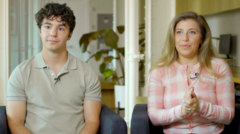A letter signed by over 400 artists urges lawmakers to update copyright laws to defend creative work against exploitation by technology firms.
Artists Unite Against AI: Urgent Call for Copyright Reform

Artists Unite Against AI: Urgent Call for Copyright Reform
British music icons and creators demand protection from AI misuse as concerns grow over copyright infringement.
The landscape of creativity in the UK is facing a potential crisis as artists, led by the illustrious Sir Elton John and pop sensation Dua Lipa, call for urgent changes to copyright laws amid rising concerns about the misuse of their work by artificial intelligence (AI).
In a pivotal letter addressed to Prime Minister Sir Keir Starmer, over 400 British musicians, writers, and artists have banded together to demand stricter safeguards that would guard their creative output from being exploited by tech companies without their consent. The signatories express that without legislative protection, they risk “giving away” their work, potentially undermining the UK’s reputation as a leading creative hub.
They are pushing for an amendment to the Data (Use and Access) Bill, which would compel developers to disclose to copyright owners how their materials are utilized in training AI models. The government responded by emphasizing its commitment to fostering both the creative industries and AI sectors, asserting that any changes to copyright laws would require thorough evaluation and assurance that they serve the interests of creators.
Notable figures such as author Kazuo Ishiguro, playwright David Hare, and music legends like Kate Bush and Robbie Williams have joined the chorus for reform. Sir Paul McCartney, who previously raised concerns about AI technologies undermining artist rights, has also signed the letter. In it, creators argue that they are essential for reflecting cultural narratives and driving innovation: "AI needs us as much as it needs energy and computer skills," they state.
The call for reform is led by Baroness Beeban Kidron, who is championing an amendment she believes would allow both developers and creators to forge robust licensing arrangements to ensure that human-created content remains valued moving forward.
However, not all experts agree with the artists' approach. Julia Willemyns of the Centre for British Progress warns that such restrictive measures could inadvertently stifle innovation within the UK, potentially pushing AI development overseas.
As debates intensify, the artists’ plea follows considerable apprehension over the inclusion of their copyrighted materials in generative AI training datasets. The increasing prevalence of AI-generated content has sparked criticism regarding ethical data use and the ecological impact of these technologies.
In February, a group of musicians, including Annie Lennox, previously protested government copyright proposals by releasing a silent album. Amidst ongoing public consultation regarding these issues, the government has been urged to reconsider proposals that allow AI developers to use creators’ work without explicit permission unless rights holders opt out.
Author Kazuo Ishiguro emphasized the fairness of preserving established copyright standards to protect individual creators from exploitative corporate practices. He noted a welcomed acknowledgment from the government that previously proposed opt-out measures may be unfeasible, hinting at the possibility for a more equitable system.
As discussions progress, Baroness Kidron underscores the potential for the UK to excel in the global AI market, contingent on transparent licensing practices laid out in her proposed amendment. The government has expressed a commitment to carefully consider all stakeholder feedback while moving toward a broader understanding of the economic impacts involved. The outcome of these deliberations could shape the future landscape of AI and its integration into the arts in the UK.
In a pivotal letter addressed to Prime Minister Sir Keir Starmer, over 400 British musicians, writers, and artists have banded together to demand stricter safeguards that would guard their creative output from being exploited by tech companies without their consent. The signatories express that without legislative protection, they risk “giving away” their work, potentially undermining the UK’s reputation as a leading creative hub.
They are pushing for an amendment to the Data (Use and Access) Bill, which would compel developers to disclose to copyright owners how their materials are utilized in training AI models. The government responded by emphasizing its commitment to fostering both the creative industries and AI sectors, asserting that any changes to copyright laws would require thorough evaluation and assurance that they serve the interests of creators.
Notable figures such as author Kazuo Ishiguro, playwright David Hare, and music legends like Kate Bush and Robbie Williams have joined the chorus for reform. Sir Paul McCartney, who previously raised concerns about AI technologies undermining artist rights, has also signed the letter. In it, creators argue that they are essential for reflecting cultural narratives and driving innovation: "AI needs us as much as it needs energy and computer skills," they state.
The call for reform is led by Baroness Beeban Kidron, who is championing an amendment she believes would allow both developers and creators to forge robust licensing arrangements to ensure that human-created content remains valued moving forward.
However, not all experts agree with the artists' approach. Julia Willemyns of the Centre for British Progress warns that such restrictive measures could inadvertently stifle innovation within the UK, potentially pushing AI development overseas.
As debates intensify, the artists’ plea follows considerable apprehension over the inclusion of their copyrighted materials in generative AI training datasets. The increasing prevalence of AI-generated content has sparked criticism regarding ethical data use and the ecological impact of these technologies.
In February, a group of musicians, including Annie Lennox, previously protested government copyright proposals by releasing a silent album. Amidst ongoing public consultation regarding these issues, the government has been urged to reconsider proposals that allow AI developers to use creators’ work without explicit permission unless rights holders opt out.
Author Kazuo Ishiguro emphasized the fairness of preserving established copyright standards to protect individual creators from exploitative corporate practices. He noted a welcomed acknowledgment from the government that previously proposed opt-out measures may be unfeasible, hinting at the possibility for a more equitable system.
As discussions progress, Baroness Kidron underscores the potential for the UK to excel in the global AI market, contingent on transparent licensing practices laid out in her proposed amendment. The government has expressed a commitment to carefully consider all stakeholder feedback while moving toward a broader understanding of the economic impacts involved. The outcome of these deliberations could shape the future landscape of AI and its integration into the arts in the UK.




















